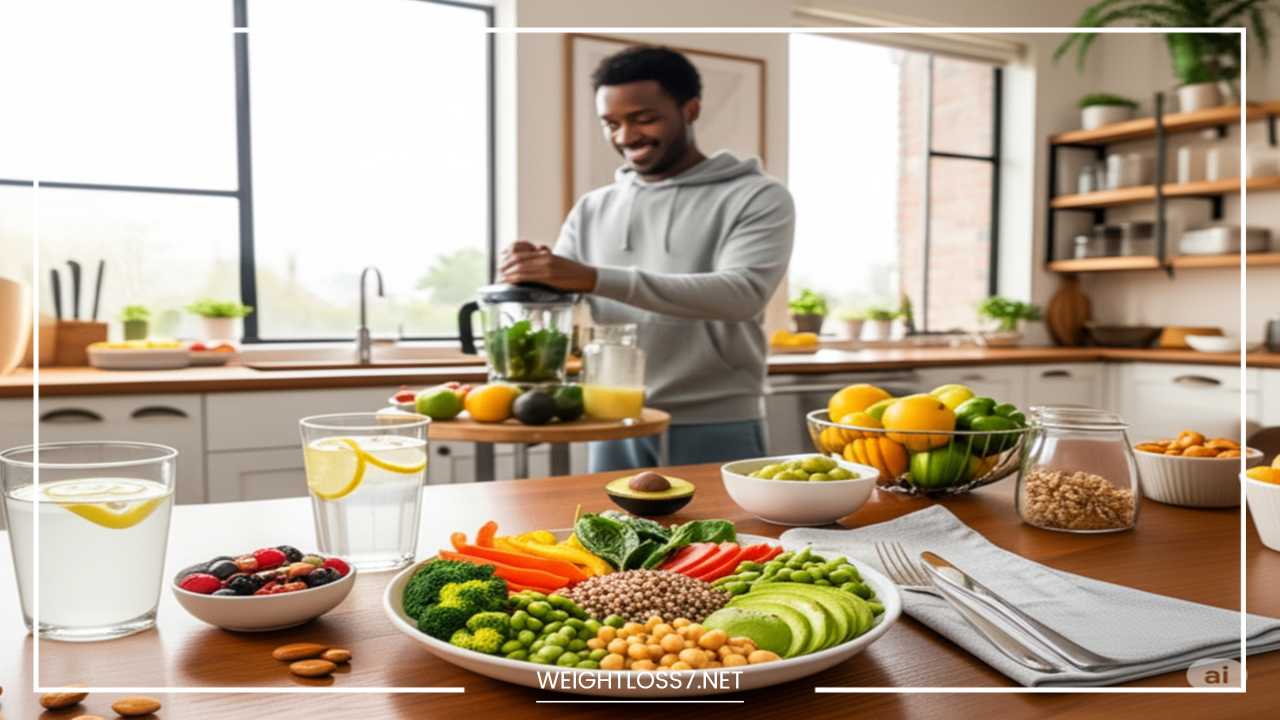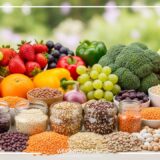How to Lose Weight Healthy
How to Cultivate Healthy Weight Loss: A Sustainable Path to Well-being
In a world saturated with quick fixes and extreme diets, the pursuit of weight loss can often feel overwhelming and unsustainable. However, true and lasting transformation isn’t found in deprivation, but in nourishment – a holistic embrace of healthy habits that prioritize well-being above all else.
This article will guide you through a comprehensive approach to achieving and maintaining a healthy weight, focusing on a vibrant, whole-food-based lifestyle, consistent movement, and a mindful connection with your body. Our journey together will emphasize sustainability, long-term health, and the joy of feeling your best, without resorting to restrictive measures or chasing fleeting results.
Understanding Healthy Weight Loss: More Than Just Numbers
Before diving into the specifics, it’s crucial to define what “healthy” weight loss truly entails. It’s not about shedding pounds at an alarming rate, but rather about a gradual, consistent process that supports your overall health and vitality. A sustainable rate of weight loss is typically considered to be 1 to 2 pounds per week. This pace allows your body to adapt, minimizes muscle loss, and fosters habits that you can maintain for a lifetime, rather than just a few weeks.
At its core, weight management revolves around the principle of energy balance: the relationship between the calories you consume and the calories your body expends. When you consistently consume more calories than you burn, your body stores the excess as fat. Conversely, to lose weight, you need to create a moderate calorie deficit. However, the quality of those calories is paramount. Focusing solely on calorie restriction without considering nutrient density can lead to deficiencies, hunger, and a stalled metabolism. Healthy weight loss emphasizes nourishing your body with nutrient-rich foods that provide sustained energy and satiety, rather than simply cutting calories. It’s about optimizing your internal environment to encourage fat loss while preserving lean body mass, ensuring your body functions optimally throughout the process.
The Power of Whole Foods in Your Weight Loss Journey
The cornerstone of a healthy weight loss strategy lies in embracing the abundance of whole, unprocessed plant-based foods. These foods are nature’s gift, packed with essential vitamins, minerals, antioxidants, and, critically for weight management, fiber. Think of a vibrant spectrum of vegetables, luscious fruits, hearty legumes (like lentils, beans, and chickpeas), wholesome whole grains (such as quinoa, oats, and brown rice), and a variety of seeds and nuts.
Fiber is a superstar in the realm of healthy weight loss. It’s the indigestible part of plant foods that adds bulk to your meals, helping you feel fuller for longer. This increased satiety can naturally lead to consuming fewer calories without feeling deprived. Fiber also plays a vital role in digestive health, promoting regularity and supporting a healthy gut microbiome, which is increasingly recognized for its influence on weight and metabolism.
Beyond fiber, the sheer nutrient density of whole plant foods is a game-changer. Unlike highly processed foods that offer “empty calories” – calories devoid of significant nutritional value – whole foods provide a wealth of nutrients for a relatively low caloric cost. This means you can eat satisfying portions, feel nourished, and still create the necessary calorie deficit for weight loss. When your body receives the nutrients it needs, it operates more efficiently, cravings for nutrient-poor foods diminish, and your natural fat-burning mechanisms are better supported. This symbiotic relationship between nutrient abundance and satiety allows for a more enjoyable and sustainable path to reaching your weight goals, eliminating the constant battle against hunger often associated with restrictive diets.
Building a Balanced Plant-Based Plate for Optimal Health
Translating the concept of whole foods into practical meal planning involves understanding the importance of macronutrient balance. Your plate should be a vibrant tapestry of complex carbohydrates, healthy fats, and ample plant-based proteins.
Complex carbohydrates, found in whole grains, fruits, and vegetables, provide sustained energy, unlike simple sugars that lead to energy crashes. They are your body’s preferred fuel source, and when chosen wisely, they contribute to a feeling of fullness and stable blood sugar levels.
Healthy fats, sourced from avocados, nuts, seeds, and olives, are essential for hormone production, nutrient absorption, and satiety. While calorie-dense, these fats are crucial for overall health and can actually help you feel satisfied, preventing overeating.
Plant-based proteins are vital for building and repairing tissues, supporting metabolism, and promoting satiety. Excellent sources include legumes (lentils, beans, chickpeas), tofu, tempeh, quinoa, edamame, and various nuts and seeds. Incorporating a variety of these sources throughout your day ensures you receive a complete spectrum of amino acids.
When building your plate, aim for a visual balance:
- Half your plate: Non-starchy vegetables (leafy greens, broccoli, bell peppers, carrots, etc.). These are low in calories but high in fiber and nutrients.
- A quarter of your plate: Whole grains or starchy vegetables (quinoa, brown rice, oats, sweet potatoes, corn).
- A quarter of your plate: Plant-based protein sources (lentils, chickpeas, tofu, tempeh).
- A small portion: Healthy fats (a few nuts, seeds, a slice of avocado).
Beyond individual meals, consider the timing and consistency of your eating patterns. Regular meal times can help regulate hunger hormones and prevent extreme hunger that often leads to overeating. Listening to your body’s hunger and fullness cues is paramount. Avoid skipping meals, as this can lead to overcompensation later in the day. Instead, aim for consistent, balanced meals that fuel your body steadily throughout the day.
Healthy Habits That Support Your Weight Loss Journey
While food forms the foundation, sustainable weight loss is also profoundly influenced by a suite of healthy habits that extend beyond the plate. These practices nourish your body and mind, creating an optimal environment for your weight loss efforts to flourish.
Hydration: Water is often overlooked, yet it’s a powerful ally in weight management. Staying adequately hydrated supports metabolism, aids in nutrient transport, and can even help differentiate between true hunger and thirst. Often, what we perceive as hunger is actually mild dehydration. Aim to drink plenty of water throughout the day, especially before meals, as this can contribute to feelings of fullness and reduce overall calorie intake. Herbal teas are another excellent, calorie-free way to boost your fluid intake.
Sleep: The impact of sleep on weight is significant and often underestimated. Chronic sleep deprivation disrupts hormones that regulate appetite: ghrelin (which stimulates hunger) and leptin (which signals satiety). When you don’t get enough sleep, ghrelin levels rise, and leptin levels fall, leading to increased hunger and cravings, particularly for high-calorie, processed foods. Aim for 7-9 hours of quality sleep per night to support hormonal balance and make healthier food choices. Establishing a consistent sleep routine can make a world of difference.
Mindful Eating: In our fast-paced world, eating often becomes a hurried, unconscious act. Mindful eating encourages you to slow down, savor each bite, and truly connect with your food. This involves paying attention to the colors, textures, aromas, and flavors of your meals. Chewing slowly, putting your utensils down between bites, and avoiding distractions like screens can help you recognize your body’s satiety cues more accurately, preventing overeating. It’s about being present with your food, rather than simply consuming it. This practice cultivates a deeper appreciation for nourishment and a more intuitive relationship with your body’s needs.
Stress Management: Chronic stress can have a profound impact on your weight loss efforts. When stressed, your body releases cortisol, a hormone that can promote fat storage, especially around the abdominal area. Stress can also trigger emotional eating, leading to cravings for comfort foods that are often high in sugar and unhealthy fats. Incorporating stress-reducing practices into your daily routine is crucial. This could include meditation, yoga, spending time in nature, deep breathing exercises, or engaging in hobbies you enjoy. Finding healthy outlets for stress helps regulate cortisol levels and prevents emotional eating cycles.
Physical Activity for Sustainable Weight Loss and Well-being
Movement is an indispensable component of a healthy weight loss journey. It’s not just about burning calories; physical activity profoundly impacts your metabolism, mood, energy levels, and overall health. When you move your body, you build and maintain lean muscle mass, which is metabolically active and helps burn more calories even at rest. Regular activity also improves insulin sensitivity, supports cardiovascular health, and boosts endorphins, leading to a sense of well-being.
There are many ways to incorporate physical activity into your life, and the key is to find what you enjoy and can sustain. Don’t feel pressured to engage in grueling workouts if that’s not your preference. Consistency and enjoyment are far more important than intensity.
Consider a balanced approach that includes various types of exercise:
- Aerobic Activity: Also known as cardio, this type of exercise elevates your heart rate and improves cardiovascular fitness. Examples include brisk walking, jogging, cycling, swimming, dancing, or hiking. Aim for at least 150 minutes of moderate-intensity aerobic activity or 75 minutes of vigorous-intensity activity per week. Even short bursts of activity,1 like a 10-minute brisk walk, can add up and contribute to your daily goals.
- Strength Training: Building muscle is crucial for boosting your metabolism and shaping your body. Strength training can involve using weights, resistance bands, or your own body weight (e.g., squats, lunges, push-ups). Aim for at least two strength training sessions per week, targeting all major muscle groups. You don’t need a gym; many effective bodyweight exercises can be done at home.
- Flexibility and Balance: Activities like yoga and Pilates improve flexibility, balance, and core strength. These practices are excellent for injury prevention, reducing stress, and improving body awareness. Incorporating even 10-15 minutes of stretching or yoga daily can make a significant difference.
Beyond structured workouts, strive to increase your daily movement. Simple changes can have a big impact: taking the stairs instead of the elevator, parking further away, walking or cycling for short errands, or taking frequent breaks to move around if you have a sedentary job. Setting daily step goals and tracking them can be a motivating way to ensure you’re moving enough. The goal is to integrate movement seamlessly into your daily life, making it a natural and enjoyable part of your routine rather than a chore. Find activities that bring you joy, whether it’s gardening, dancing, or exploring new trails, and you’ll be more likely to stick with them for the long haul.
Smart Snacking and Mastering Craving Control
Hunger between meals is a natural part of the weight loss journey, but it doesn’t have to derail your progress. The key lies in making smart snacking choices that nourish your body and keep you feeling satisfied, rather than reaching for processed, high-sugar options. Think of snacks as mini-meals that bridge the gap between your main meals, preventing extreme hunger that can lead to overeating.
Focus on whole-food snacks that combine fiber, healthy fats, and plant-based protein for sustained energy and satiety. Here are some excellent examples:
- Fruit with a nut butter: An apple or banana with a tablespoon of almond or peanut butter provides natural sugars for energy, fiber, and healthy fats.
- Hummus and chopped vegetables: Carrots, celery sticks, bell peppers, or cucumber slices dipped in hummus offer fiber, protein, and a satisfying crunch.
- A handful of nuts and seeds: Almonds, walnuts, cashews, chia seeds, or flax seeds are packed with healthy fats, fiber, and a good dose of plant-based protein. Portion control is key here due to their calorie density.
- A small bowl of berries with a sprinkle of seeds: Berries are rich in antioxidants and fiber, and seeds add healthy fats and protein.
- A nourishing smoothie: Blend plant-based milk with a handful of spinach, a banana, and a scoop of plant-based protein powder for a quick and nutritious option.
Beyond strategic snacking, understanding and managing cravings is crucial. Cravings are often rooted in emotional triggers, stress, boredom, or even dehydration. Instead of immediately giving in, pause and ask yourself:
- Am I truly hungry, or am I thirsty? Drink a glass of water and wait 10-15 minutes.
- Am I feeling stressed, bored, or emotional? Identify the underlying emotion and find a non-food coping mechanism, such as taking a walk, listening to music, meditating, or calling a friend.
- Do I genuinely want this particular food, or am I just looking for a distraction? Sometimes, simply acknowledging the craving without acting on it can lessen its intensity.
Keeping healthy snacks readily available and removing tempting processed foods from your environment can significantly reduce the likelihood of succumbing to unhealthy cravings. Remember, occasional indulgence is part of a balanced life, but learning to differentiate between true hunger and emotional triggers empowers you to make conscious, supportive choices for your weight loss journey.
Tracking Progress Beyond the Scale: A Holistic View
In the quest for healthy weight loss, it’s easy to become fixated on the number on the scale. While the scale can offer a snapshot of progress, it tells only a small part of the story. Weight fluctuates daily due to water retention, hormonal changes, and digestive contents, and an over-reliance on it can lead to frustration and demotivation. To truly gauge your progress and maintain a positive mindset, it’s essential to track success in a more holistic way, looking beyond just pounds lost.
Consider these non-scale victories and indicators of true progress:
- Increased Energy Levels: Are you waking up feeling more refreshed? Do you have sustained energy throughout the day without relying on caffeine? This is a strong indicator that your body is being nourished and functioning optimally.
- Improved Mood and Mental Clarity: Healthy eating and regular movement can significantly impact your mental well-being. Notice if you feel more positive, less anxious, or have better focus.
- Better Sleep Quality: As discussed, sleep is crucial. Are you falling asleep more easily and experiencing deeper, more restorative sleep?
- Clothing Fit and Body Composition: How do your clothes feel? Are they looser? Do you see changes in your body shape, even if the scale hasn’t moved much? This often indicates a positive shift in body composition, with fat loss and potential muscle gain.
- Enhanced Physical Performance: Can you walk further, lift more, or feel stronger during your workouts? These are tangible signs of improved fitness.
- Improved Digestive Health: Are you experiencing more regular and comfortable digestion? This reflects the positive impact of increased fiber and whole foods.
- Reduced Cravings: As your body becomes accustomed to nutrient-dense foods, you’ll likely find that cravings for processed items diminish.
- Positive Relationship with Food: Are you making more intuitive and mindful food choices, free from guilt or restriction? This is a monumental step towards sustainable health.
The importance of patience and a long-term mindset cannot be overstated. Healthy weight loss is a journey, not a race. There will be plateaus, and there will be weeks when the scale doesn’t budge, or even shows a slight increase. This is normal. Focus on the consistency of your healthy habits rather than daily fluctuations. Celebrate every small victory – a healthy meal prepared, a walk taken, a good night’s sleep. Your body is undergoing a transformation, and that takes time. By shifting your focus from the numbers to the profound improvements in your overall health and well-being, you foster a sustainable and joyful relationship with your weight loss journey.
Final Thoughts and Encouragement: Your Sustainable Path to Well-being
Embarking on a journey of healthy weight loss is a powerful act of self-care. It’s a commitment to nurturing your body and mind, embracing a lifestyle that champions vitality, energy, and sustained well-being. This article has illuminated a path built on the principles of whole-food nourishment, consistent movement, mindful living, and patience – a stark contrast to the fleeting allure of extreme diets and quick fixes.
We’ve emphasized the transformative power of a plant-based diet, rich in vegetables, fruits, legumes, whole grains, seeds, and nuts. These foods are your allies, providing the fiber, nutrients, and sustained energy needed to feel satisfied and support your body’s natural fat-burning processes. We’ve explored the critical role of healthy habits, from adequate hydration and restorative sleep to mindful eating and effective stress management, all of which create an optimal internal environment for your weight loss efforts to flourish. Physical activity, in its myriad forms, has been highlighted not just for calorie expenditure but for its profound impact on metabolism, mood, and overall strength.
Remember, healthy weight loss is not about deprivation; it’s about abundance – an abundance of nutrient-dense foods, joyful movement, and self-compassion. It’s about cultivating sustainable habits that you can integrate seamlessly into your life, not just for a few weeks, but for a lifetime. The goal isn’t to reach a specific number on the scale at any cost, but to feel energized, vibrant, and confident in your body, living a life brimming with health and vitality.
Be patient with yourself, celebrate every small victory, and understand that consistency trumps perfection. Your body is resilient and capable of incredible transformation when given the right tools and loving attention. Focus on the process, trust in the power of whole foods and consistent movement, and embrace this journey as an opportunity to build a healthier, happier, and more sustainable relationship with yourself. Your well-being is the ultimate reward, far more valuable than any fleeting number on a scale.


















